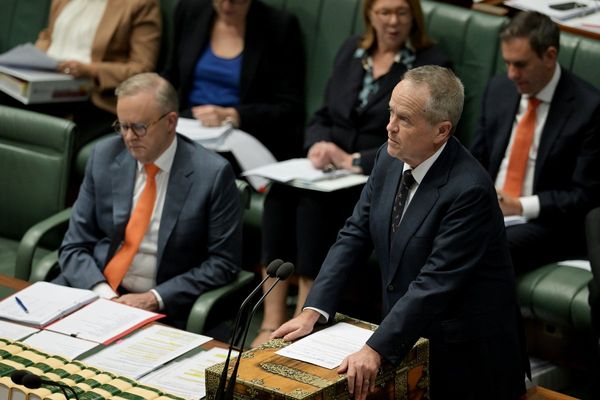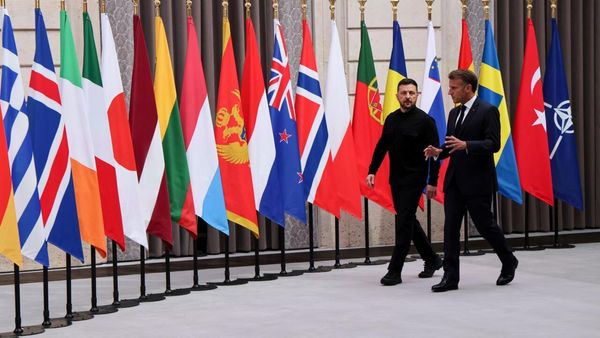OPEC+, which includes Russia among its partners, decided to keep its production increase steady when it met Wednesday, helping boost oil prices to an 11-year high amid Russia's invasion of Ukraine.
In a quick meeting that lasted under 15-minutes, the group agreed to continue its incremental increases in production and will add 400,000 barrels per day to the market next month. OPEC+ has received international pressure to add to that target and attempt to force oil prices lower. But so far the group has had mixed success in producing enough oil even to meet its current output goals.
"Current oil market fundamentals and the consensus on its outlook pointed to a well-balanced market, and that current volatility is not caused by changes in market fundamentals but by current geopolitical developments," the group said in a press release following the meeting.
OPEC+ will meet again on March 31 to discuss its output for May.
In the futures markets, West Texas Intermediate closed up 7.8% to $111.44 a barrel after hitting $112.51 intraday. Brent closed up 8.8% to $114.26 per barrel.
Oil Prices Surges As Traders Shun Russian Crude
On Tuesday, the U.S. and its allies moved to help prevent a supply crunch ahead of the OPEC+ meeting. Members of the International Energy Agency agreed to release 60 million barrels from oil reserves on Tuesday, with half the release coming from the U.S. Strategic Petroleum Reserve.
But the announcement had little impact on oil prices with U.S. oil prices surging to multiyear highs Tuesday.
The reserve release is "dwarfed by the potential magnitude of Russia's export disruptions," Goldman Sachs analysts wrote in a March 1 note. The 60 million barrel release would only offset a loss of Russian seaborne exports for 10-days or a 2 million barrel-per-day loss of supply for just one month.
While no direct sanctions have yet been placed on Russian oil or oil sales, global oil traders are reportedly avoiding the commodity. Russian traders offering oil at discounts of up $20 per barrel have been unable to move product, rerouting portions of global energy supply chains. Oil prices surged on Wednesday as news broke of the de facto sanctions, limiting global supply
Putin Heads Into Isolation; Oil Prices Rise
The U.S. and its Western allies ramped up their economic sanctions on Russia over the weekend, sending the ruble into free fall. Russia shut down its stock market Monday and it hasn't reopened. And the central bank hiked its target interest rate from 9.5% to 20% as the U.S. moved to bar the bank from conducting transactions in U.S. dollars.
Investors worldwide are watching to see if and when tightening sanctions hit Russia's energy sector. Or whether Russia will retaliate by withholding or rerouting oil and gas shipments.
Multinational groups and global financial markets are quickly excising Russia as sanctions set in. Some Russian banks are now restricted from participating in the Society for Worldwide Interbank Financial Telecommunication — the Swift global bank communications payment system.
LNG Stocks In Focus Amid Europe's Energy Search, As Russia/Ukraine Sabers Rattle
Still, Saudi Arabia's Crown Prince Mohammed bin Salman told French President Emmanuel Macron earlier this week that he supports OPEC's continued alliance with Russia.
"In this regard, his highness the crown prince affirmed the kingdom's keenness on the stability and balance of oil markets and the kingdom's commitment to the OPEC+ agreement," a report from the Saudi Press Agency said.
Russia teamed up with OPEC in 2016, creating OPEC+, in an effort to support oil prices.
International Pressure On Russia's Oil Industry
However, Russia's struggling oil sector may limit its role in the expanded alliance. S&P Global Platts said in a recent report that the relationship was already on shaky ground. The group has been unable to expand production enough even to meet its own output targets.
And international pressure on Russia's energy industry continues. BP announced Sunday that it's exiting its nearly 20% stake in Russia's Rosneft energy company. The company valued the stake at $14 billion, and could record charges of up to $25 billion on the decision.
Time The Market With IBD's ETF Market Strategy
Then on Monday, Shell said it would end its involvement in the Nord Stream 2 natural gas pipeline project. And Canada announced it would ban the import of Russian oil.
Exxon Mobil said Tuesday that it would not invest in new developments in Russia and would pull out production operations at Sakhalin Island.
Follow Gillian Rich on Twitter at @GillianRich_ for energy news and more.
YOU MIGHT BE INTERESTED IN:
Russia's Ukraine Invasion Poses Big Economic Risks
Catch The Next Big Winning Stock With MarketSmith
Defense Stocks Climb As Europe, U.S. Promise More Military Aid To Ukraine
These Are The 5 Best Stocks To Buy And Watch Now
Market Rallies On 'Nimble' Fed, But Still Must Do This; 5 Stocks Near Buys







